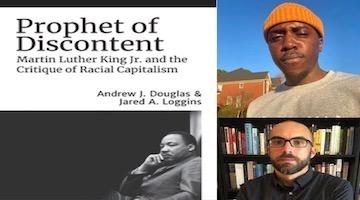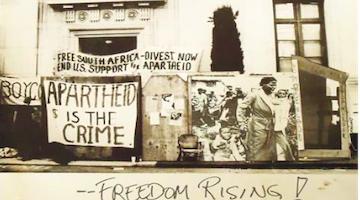Freedom Rider: The Central Park Five and the Limits of Suffering -- Prosecutors Linda Fairstein (left) and Elizabeth Lederer (right)
Corporate media green-light films that ratchet up an emotional response without motivating anyone to action.
“Where is the movie about the Black Panther standoff with police in Los Angeles in 1969?”
As a New Yorker this columnist will never forget the awful events that unfolded in 1989. When a white woman was raped, beaten and left unconscious in Central Park, five teenagers were swept up in a police dragnet. Anton McCray, Korey Wise, Yusef Salaam, Kevin Richardson and Raymond Santana confessed on video after hours of food and sleep deprivation and in some cases separation from their parents or other adults. None had legal representation. They were all convicted and spent between 7 and 13 years in prison. They should have been released immediately when DNA testing proved that none of them had assaulted the victim.
But they were condemned by people like Donald Trump who paid for a full-page newspaper ad asserting their guilt and demanding the death penalty. Trump was part of a very large and influential lynch mob. The tabloid media invented the phrase “wilding” and attached it to every black teenager in the country. The case was used to justify treating juveniles as adults in the criminal justice system. The five teens had very few defenders and were largely forgotten until 2002 when a serial rapist was tied to the crime by DNA evidence and confessed his guilt.
Aside from a 2013 Ken Burns documentary the story has gone largely untold. But the new Ava Duverney dramatization, When They See Us, brought renewed attention to the case. Duverney responded to a request from Santana to tell their story.
“Trump was part of a very large and influential lynch mob.”
I must disclose that I have not seen the movie and I have done so purposefully. I also avoid watching the plethora of videos depicting police violence and murder. Unless viewing these images sparks education and activism it becomes little more than self-inflicted trauma.
The details of this case are new to many people, but the system that committed the crime should be well known to everyone. Without watching any movies we know that the police in this country kill an average of three people every day and that one of those persons will be black. We know that the U.S. incarcerates more people than any other nation on earth. Every day we see a news story about inmates who are exonerated after serving decades in prison. Those people are almost always black men.
As for delayed justice, the City of New York did not compensate the men until 2014, twelve years after they were exonerated. The payment wasn’t made for the simple reason that mayor Michael Bloomberg refused to allow it. He directed the city to delay and appeal and it was left to his successor to bring some measure of justice with a $41 million settlement. Bloomberg is as much a villain as Trump but no one, including Hollywood, wants to point that out and anger the billionaire.
“Bloomberg is as much a villain as Trump.”
Another unsung perpetrator is Manhattan district attorney Robert Morgenthau. Morgenthau was lead prosecutor Linda Fairstein’s boss. He could have stopped the process at any time. He didn’t and even after the exoneration he successfully ran for his ninth term in office in 2005 at the age of 85. The outcome of the case should have made him unelectable but he was and is spared condemnation.
The next time someone posts a video of police brutality on social media ask yourself if you need to watch it. Ask yourself if doing so would be helpful to anyone. Ask why black suffering has become an entertainment commodity. The late John Singleton was preparing to direct a movie about the murder of Emmett Till. There was a documentary about Trayvon Martin and a feature film about Oscar Grant.
It is argued that When They See Usand other works like it are informative teaching tools. One hopes so but the black victim genre isn’t necessary to serve this purpose. There is so much material to mine which could be equally informative and far more empowering. Where is the movie about the Black Panther standoff with police in Los Angeles in 1969? Perhaps there can be a film about two black men, Micah Johnson in Dallas, Texas, and Gavin Longin Baton Rouge, Louisiana, whose anger about police murder led them to shoot the police in two separate incidents in 2016. Will Hollywood pay for a dramatization about Johnson and Long? The question is rhetorical because the answer is obviously no.
“Manhattan district attorney Robert Morgenthau could have stopped the process at any time.”
Trump and Fairstein are not the only evil doers in this tale. Morgenthau, Bloomberg and reporters and editors at the New York Times, New York Daily Newsand New York Postwere as well. But why is Bloomberg’s name never connected to the five men? Why was Fairstein’s boss given a pass?
That is because these corporate media efforts are not serious. They are not meant to upset the status quo. Their sole purpose is to ratchet up an emotional response and to do so without motivating anyone to action. These films have not decreased police brutality or led anyone to start a movement. The victims are commodified and the viewer is exposed to suffering porn. The powerful people who keep the corrupt wheels in motion remain untouched, even on the screen.
It is true that Linda Fairstein has finally gotten something akin to just desserts. She parlayed what should have been infamy into a successful writing career. Even after the exoneration the New York Timesand other outlets would often quote her as a sex crimes expert. But now she is being dropped like a bad habit from publishing houses and non-profit boards. If When They See Usis responsible for her belated comeuppance it achieved at least one worthy goal.
“These films have not decreased police brutality or led anyone to start a movement.”
But if we were politically educated and engaged in protest with specific demands and serious intent, Fairstein and Morgenthau would have been shunned and discredited as soon as the five men were freed. If telling the story of the Central Park Five is transformational it should inspire us to take action right now.
We need a consistent plan to fight the racist police occupations of our communities. The attachment to watching brutalization is borne of impotence. It has been many decades since a mass movement effectively confronted the system. Now we settle for well meaning voyeurism.
Movement building is a difficult process. Our inaction is caused by confusion. We don’t know what we should be doing and hope that knowing the gory details of a particular case is a political accomplishment. But it isn’t and it is time to say so. Let us admit that we have to start from scratch and determine how to secure justice for our people. Entertainment is a poor substitute.
Margaret Kimberley’s Freedom Rider column appears weekly in BAR, and is widely reprinted elsewhere. She maintains a frequently updated blog as well at http://freedomrider.blogspot.com . Ms. Kimberley lives in New York City, and can be reached via e-Mail at Margaret.Kimberley(at)BlackAgendaReport.com.
COMMENTS?
Please join the conversation on Black Agenda Report's Facebook page at http://facebook.com/blackagendareport
Or, you can comment by emailing us at comments@blackagendareport.com



















